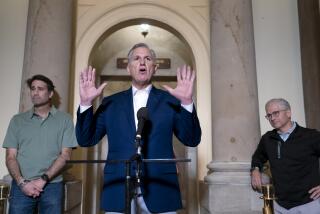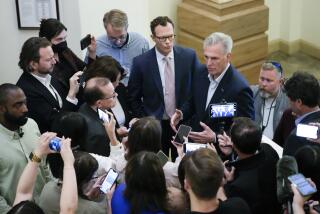S&L; Bailout Bill Bogs Down Over Financing Methods
- Share via
WASHINGTON — House negotiators on the savings and loan rescue package will insist today that the financing of the bailout must be included in the federal budget, setting up a confrontation with the Senate and the Bush Administration.
In a closed-door caucus Monday, the House members of the House-Senate conference committee trying to resolve differences between the two houses’ versions of the bill decided that they would not compromise on their insistence that the S&L; cleanup be handled with funds raised from the sale of Treasury bonds.
“There is no negotiating on the budget issue; we’re going to stand firm,” said a House aide who attended the caucus. “I don’t know if this dispute can be resolved--maybe with a fist fight,” the aide said jokingly.
Despite the sharp differences on the funding issue, however, the House and Senate are in amicable agreement on most of the bailout’s other key issues. House Banking Committee Chairman Henry B. Gonzalez (D-Tex.) told his colleagues in the caucus: “I doubt very much that anyone on this committee can remember an occasion when the Senate moved to accept so much of the House position--most certainly not on a bill of this magnitude.”
The conferees are generally agreed on combining tough elements of both bills to create a strict capital standard for thrifts. S&L; owners would be forced to supply billions of dollars in new cash to strengthen the fiscal foundations of their institutions. If they must place more of their own money at risk, the S&L; owners are expected to be less likely to make the dubious loans that have caused hundreds of S&Ls; to fail.
Junk bonds still pose an unresolved issue, with the Senate proposal allowing S&Ls; to keep these high-yield issues in their portfolios, while the House wants complete disposal of junk bonds within two years. “This remains a sticking point,” a House source said.
Fiscal Heresy
But financing is the major disputed area. The Senate approved the Bush Administration’s plan, which calls for creation of a new federal agency to issue $50 billion in bonds. The money would be used to close hundreds of S&Ls; and pay off their depositors, whose accounts are insured by the federal government up to $100,000.
However, the House says the taxpayers can save money if the funds come from the sale of Treasury bonds, which carry the lowest interest rate of all government issues. The House wants to use Treasury-bond financing but would provide a waiver from the federal law that limits the size of the budget deficit. Under the House plan, the $50 billion for the S&L; cleanup would be included in the budget but would not count against the deficit target.
This approach is fiscal heresy as far as the Bush Administration is concerned. If the spending limits are waived for the S&L; crisis, the Administration fears, similar action could be taken by Congress to deal with other pressing issues, such as the war on drugs, or to alleviate the national problem of homelessness.
President Bush and Treasury Secretary Nicholas F. Brady have sent repeated messages to the conference, declaring that the House’s on-budget financing plan is unacceptable.
Progress on Other Issues
But Gonzalez told his caucus meeting Monday: “We must insist on the House position” on financing.
The caucus made major progress on other issues. It decided to:
Accept the Senate proposal that federal regulators be given broad authority to suspend deposit insurance when an institution engages in unsafe and unsound practices, sustains big losses or lacks capital.
Insist on the House bill’s provision making the Federal Deposit Insurance Corp. the primary federal regulator of state-chartered S&Ls;, which are now under the Federal Home Loan Bank Board.
Accept the Senate provision limiting loans to any one borrower to 15% of an institution’s capital.
Offer a compromise requiring Senate confirmation for the chairman of the FDIC and the new Office of Thrift Supervision. The House originally wanted to dump M. Danny Wall, chairman of the Federal Home Loan Bank Board, which is now the primary thrift regulator, and the Senate wanted to keep him in the job. The new House proposal would require him to undergo a new Senate confirmation hearing.
The conferees originally planned to finish their work today, a goal that now seems hopelessly unrealistic.
More to Read
Get the L.A. Times Politics newsletter
Deeply reported insights into legislation, politics and policy from Sacramento, Washington and beyond. In your inbox twice per week.
You may occasionally receive promotional content from the Los Angeles Times.










